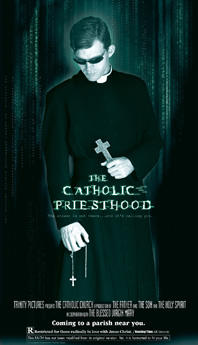 On the recruitment poster, a young Roman Catholic priest in full cassock stands before a black backdrop gripping a cross in one hand and a rosary in the other. A halo of light surrounds him, but his expression is far from angelic. He stares grimly at the ground, his eyes obscured by dark sunglasses.
On the recruitment poster, a young Roman Catholic priest in full cassock stands before a black backdrop gripping a cross in one hand and a rosary in the other. A halo of light surrounds him, but his expression is far from angelic. He stares grimly at the ground, his eyes obscured by dark sunglasses.The poster is a takeoff on ads for the movie "The Matrix" and was developed by a youth minister in the Archdiocese of Indianapolis to send a message about enrolling in seminary: Priests, like the Keanu Reeves character in the film, fight for good in a tough world.
Yet, over the last three years of the clergy sex abuse crisis, priests have come to be identified by some in the public with the dark side of human behavior. U.S. bishops have responded by transforming their child protection policies and removing accused clergy from church work.
Now what church leaders hope is another key step in their long march toward healing is getting underway: Vatican-directed evaluators have started visiting all 229 American seminaries, looking for lapses in teaching about celibacy that contributed to the scandal.
Already the effort has caused a stir in the church with revelations that the document from the Vatican's Congregation for Catholic Education directing evaluators calls on them to look for "evidence of homosexuality" in seminaries. Meanwhile, the same Vatican office is expected to soon release a document signaling that gays are not welcome in seminaries.
That's triggered a heated debate over whether celibate, gay priests can or should serve the church and created more controversy at a time when the seminary visits are highlighting a question that has puzzled Catholic researchers for decades: How can the Church revive what looks like a dying profession?
"I'm continually amazed in these times when you're faced with the situation of the church in the United States and the problems the church has encountered in the last few years, that there are young men who are willing to step forward and respond to the Lord's call," said Monsignor Robert Coleman, rector of the Immaculate Conception Seminary at Seton Hall University in New Jersey. "God-willing, more will continue to respond to the call."
The statistics are sobering: Since 1965, the number of annual ordinations has dropped by more than half to 454 this year. Enrollment in graduate-level seminaries has dropped from 8,325 to 3,308 in the same period. Thousands more parishes are without a resident priest and the average age of Catholic clergy is climbing.
from Times Daily
No comments:
Post a Comment